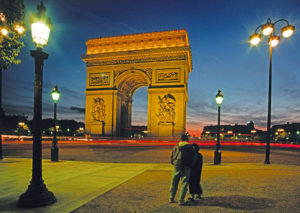
Arrivederci, for now.
So it’s official: the 27-nation European Union will block travelers from the United States from entering their countries indefinitely after reopening their borders July 1 to a number of other nations, including Canada, Australia, New Zealand — and even China, should the Chinese reciprocate.
So it’s arrivederci Roma, au revoir Paris, and adiós Barcelona — most likely for the summer and probably longer, since the U.S. leads the rest of the world, by far, in confirmed cases of both COVID-19 infections and deaths. And there’s little hope of this tragedy slowing down in the near future, with the virus currently sweeping like wildfire across the American South and Southwest, including the three most populous states: California, Texas, and Florida.
The outlook is equally bleak in Arizona, where I’ve lived for the past five years — and where I’ve seldom ventured from my home for the past three months, except to get out for walks, to visit nearby family, and drive to the grocery store parking lot to pick up provisions. As a baby boomer over 60, I’m in one of the high-risk groups.
Texas, Florida, Arizona (and, to a lesser extent, California) are all run by governors who tried to reopen their economies too soon, skirting or ignoring federal government public health guidelines to take a more cautious, step-by-step approach. (In fairness, none of the 50 states have strictly adhered to all the recommendations).
All four states are now backtracking, reimposing (depending on location) some restrictions on bars, beaches, gyms, water parks, cinemas and the like. But with the ICU units at many hospitals straining under the sheer volume of incoming patients — who are often much younger than in the previous outbreaks that devastated the East and West coasts and parts of the Midwest — these appear to be classic cases of too little, too late.
Of course, with the U.S. President refusing to even wear a face mask in public and clearly “moving on” from taking any serious leadership role in combating this health crisis, much of the American public has been left confused and in denial about the risks of catching the virus.

Au revoir, Paris. Photo by Dennis Cox / WorldViews
Lacking a comprehensive national strategy to combat the virus — mostly leaving it up to 50 states and thousands of municipalities to devise their own solutions — the U.S. has become the kind of jumbled and divided union that some Americans have long accused Europe of being.
The Stay at Home Summer?
While I’ve always been opposed to unnecessary travel restrictions — usually brought on by short-sighted and often self-serving politicians — I can’t say I blame the E.U. for keeping me and my fellow Americans at bay, no matter how much our US$100 billion annual spending there helps fuel their economies.
Leaving aside for the moment that the U.S. itself still blocks travelers from a number of European countries as well as those from China, Brazil, and various Muslim nations, the sad fact is that due largely to incompetent and negligent leadership, we have managed to become pariahs on much of the world stage even as we near our July 4 (Independence Day) celebrations.
And with no cruise ships leaving from U.S. ports for at least the next two and a half months, and flying promising to be even more cumbersome — and potentially health-threatening — than usual, Americans are facing the prospect of a mostly stay-at-home summer.
Road trips will become one potential outlet, for those willing to take their chances on staying in hotel and motel rooms, eating in restaurants, and braving crowds at popular attractions — if they’re even open.
Camping, outdoor dining in eateries, and lesser-visited national parks should all see a resurgence.
RV travel should take off, since it offers the opportunity to sleep, eat, and social distance on your own as much as possible. But it’s inevitable that, willingly or not, you’ll have some contact with fellow humans — any of whom could inadvertently send you to the ER.

Fresh juices to drink in Barcelona, in a variety of flavors — but not for Americans. Photo by Clark Norton.
Even driving may prove problematic if states and localities start issuing edicts for visitors from current hotspots to self-quarantine for two weeks before entering. Whether such edicts are legally enforceable or not is less the point than that travelers with Florida license plates, for example, might be socially shunned while trying to vacation in, say, New York.
Welcome to the Big Apple — now turn around and go home! (or at least to Pennsylvania)
And there have been plenty of reports of residents of small, idyllic towns — many of which depend on tourism for their livelihoods — giving the stink-eye to folks from the big cities fleeing to “safer” grounds.
Everyone Must Choose
As a travel writer — and a travel junkie — it pains me to say that without a vaccine or effective treatments, it simply won’t be entirely or even mostly safe to travel either internationally or domestically any time in the near future.
Those of us who’ve reached a “certain age” will have to decide whether the pleasures and rewards of travel are worth the very real risks, to ourselves as well as to our families, friends, health care workers, and our fellow citizens.
Whether we choose to travel or not — even if we’re permitted to — is the big question that all of us will have to wrestle with and answer.
And right now, as a baby boomer who is getting very itchy to hit the road but not knowing at all what the future will bring, I just don’t know what that answer will be.










4 Responses to Americans, Forget Your European Vacation